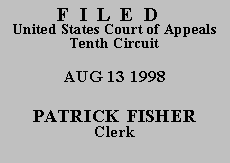

| ROBERT RICHARDSON,
Plaintiff-Appellant, Defendants-Appellees. |
No. 98-1070
(D.C. No. 97-S-2503) (Colorado) |
Plaintiff Robert Richardson filed a pro se complaint contending that defendants and the district court violated his rights in a prior civil action in which the court granted summary judgment for these same defendants. The nature of the prior action and its procedural history are set out in the order of the district court granting defendants' motion to dismiss the present action for failure to state a claim. Mr. Richardson appeals.
We construe liberally the pleadings of pro se litigants. See Hall v. Bellmon, 935 F.2d 1106, 1110 (10th Cir. 1991). "We review de novo a district court's dismissal of a cause of action for failure to state a claim upon which relief can be granted." Chemical Weapons Working Group, Inc. (CWWG) v. United States Dep't of the Army, 111 F.3d 1485, 1490 (10th Cir. 1997).
Mr. Richardson complains on appeal that the district court erred when it denied his motion to amend. Contrary to Mr. Richardson's assertion, the district court considered the complaint as amended to include a claim under 28 U.S.C.
§ 1746 as Mr. Richardson requested. The district court then correctly determined that section 1746 is not applicable to a civil case and dismissed the amended complaint for failure to state a claim upon which relief can be granted.
Mr. Richardson further contends defendants violated his rights under 42 U.S.C. § 1983 by committing perjury. Defendants are not subject to liability under section 1983 because they are not state actors and have no authority to act under color of state law.
After a thorough review of the record and Mr. Richardson's contentions, we AFFIRM for substantially the reasons stated by the district court in its order dated February 2, 1998, granting the motion to dismiss.
The judgment of the United States District Court for the District of Colorado is AFFIRMED.
ENTERED FOR THE COURT
Stephanie K. Seymour
Chief Judge
*.This order and judgment is not binding precedent, except under the doctrines of law of the case, res judicata, or collateral estoppel. The court generally disfavors the citation of orders and judgments; nevertheless, an order and judgment may be cited under the terms and conditions of 10th Cir. R. 36.3.